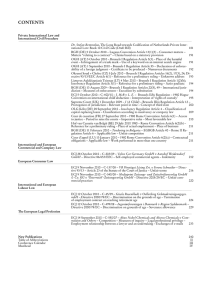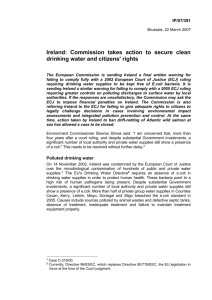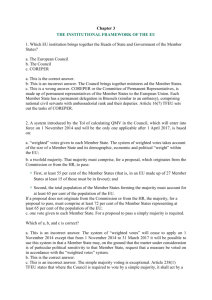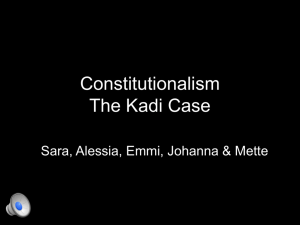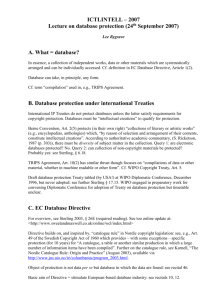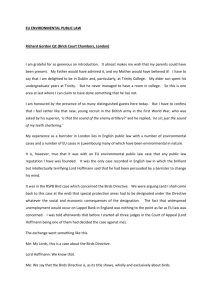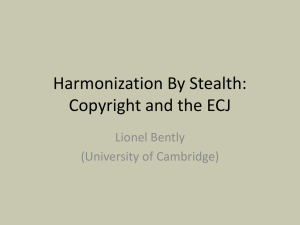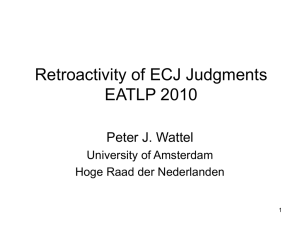Annual Conference 2011 Septic Tanks.
advertisement
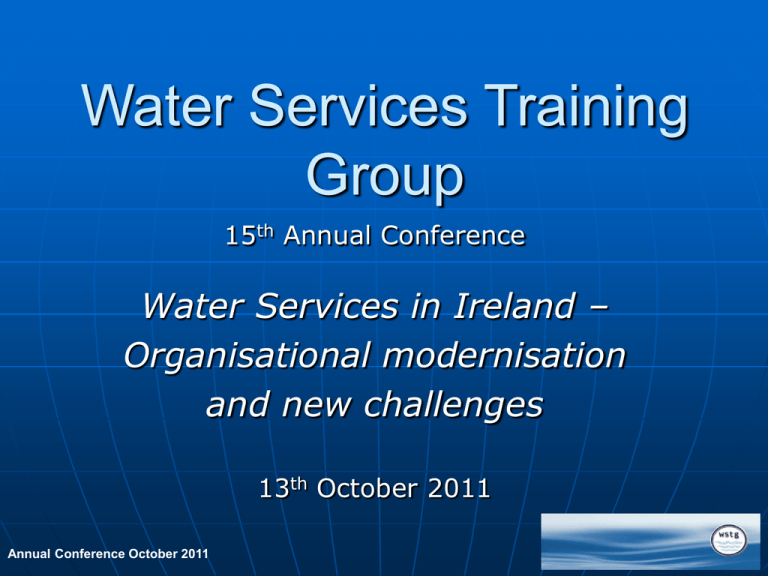
Water Services Training Group 15th Annual Conference Water Services in Ireland – Organisational modernisation and new challenges 13th October 2011 Annual Conference October 2011 Waste Water Treatment & Disposal Systems for Single Houses A new Regime – What will it involve? Gerry Galvin Principal Adviser (Water) DECLG Annual Conference October 2011 ECJ Case October 2009, ECJ ruled that Ireland had failed to comply with the Waste Directive regarding domestic waste waters disposed of through individual waste water treatment systems Consequence for failing to address the Judgment – Lump Sum Penalty of €2.7m plus daily fines of €26,000 per day (> €9.5m per annum) Annual Conference October 2011 ECJ ruling The Directive requires that waste is recovered or disposed of without endangering human health or harming the environment, and in particular: • without risk to water, air, soil and plants and animals, • without causing a nuisance through noise or odours, • without adversely affecting the countryside or places of special interest. ECJ Ruling Article 8 of Directive 75/442: ‘Member States shall take the necessary measures to ensure that any holder of waste: has it handled by a private or public waste collector or by an undertaking which carries out the operations listed in Annex II A or B, or recovers or disposes of it himself in accordance with the provisions of this Directive.’ OSWTS Multi-sectoral response required e.g. water policy, quality, planning & building control within DECLG Working group set up with reps from these sections to advise on coordinated response ECJ ruling Ireland’s defence - argued that domestic waste waters not covered by the Waste Directive Cited body of existing legislation including Public Health Acts, Water Pollution Acts, Building Control Acts and Regulations, Planning and Development Acts and Water Services Act ECJ ruling - response ECJ did not accept Ireland’s defence Court noted that bye-laws in County Cavan meet the requirements of the directive Would bye-laws in every county be the appropriate response? ECJ Ruling - response Key features of the Cavan bye-laws: Apply to all systems (old and new) Set standards – compliance with EPA manual Provide for periodic inspection by a competent person (7 years) Provide for remedial works and establish penalties for non-compliance Task Force Working Group extended to include CCMA & EPA Advise in respect of legislation required Advise on development of Performance Standards Advise on Training Needs for inspection regime National Rural Water Committee added in 2010 ECJ Ruling - response Discussions with legal advisers & EU Commission Not considered practical for compliance to be pursued through the adoption of byelaws by all the other local authorities. To ensure uniform standards it was proposed to take a national approach to this issue. Implications for Households Census 2006 – 441,000 households served by a septic tank or other on-site treatment system Water Services Act 2007 places a duty of care on the occupier of a premises or, if unoccupied, the owner, to ensure that waste water from the premises does not cause nuisance or risk to human health or the environment. EPA Code of Practice – recommends annual desludging and regular, ongoing maintenance Ireland’s Response Performance standards – to apply to all systems Establish a robust system for monitoring and assessment Consultations with the key stakeholders Prepare legislation and submit to Government Ongoing dialogue with EU Commission International Practice Review Northern Ireland – c. 120,000 Scotland – c. 150,000 Finland – c. 300,000 Czech Republic – c. 150,000 Stakeholder Consultation 190 bodies invited to participate by issue of questionnaire Environmental Groups Industry Local Authorities Government Departments Professional Bodies State Agencies 52 responses received Intended to publish all submissions later this year Proposed Regime Owners required to register OSWTS Local authorities to maintain register with EPA holding a national register On-line registration is being developed Facility also for paper registration Registration fee of €50 Registration to be valid for 5 years Registration process will commence in 2012 Inspection Regime EPA to draw up national inspection plan Plan to be proportionate and riskbased Targeted to areas where drinking water sources or habitats are likely to be, or have been, impacted upon by discharges from OSWTS Inspection Regime E.g. Inspections • 1% = 5,000 per annum • 2% = 10,000 per annum Will target both registered and unregistered OSWTS EPA approved Inspectors Competency criteria for Inspectors will be specified in Regulations Inspections will commence in 2013 Inspections Improved maintenance Remediation Upgrading Possible options for financial support will be considered in context of overall budgetary situation and financial position of individual households Legislation New Bill will be published in next few weeks with full details Following enactment, new Regulations to put in place to commence the regime Training programme for inspectors is being developed in conjunction with WSTG
